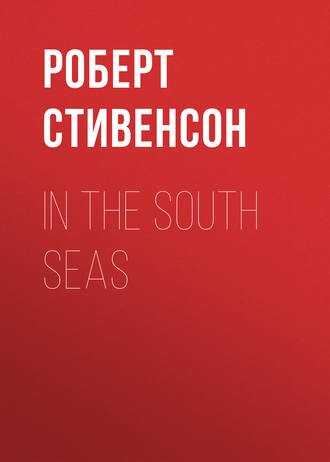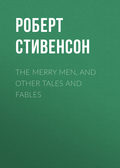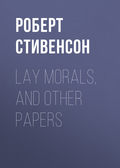
Роберт Льюис Стивенсон
In the South Seas
CHAPTER IV – THE KING OF APEMAMA: EQUATOR TOWN AND THE PALACE
Five persons were detailed to wait upon us. Uncle Parker, who brought us toddy and green nuts, was an elderly, almost an old man, with the spirits, the industry, and the morals of a boy of ten. His face was ancient, droll, and diabolical, the skin stretched over taut sinews, like a sail on the guide-rope; and he smiled with every muscle of his head. His nuts must be counted every day, or he would deceive us in the tale; they must be daily examined, or some would prove to be unhusked; nothing but the king’s name, and scarcely that, would hold him to his duty. After his toils were over he was given a pipe, matches, and tobacco, and sat on the floor in the maniap’ to smoke. He would not seem to move from his position, and yet every day, when the things fell to be returned the plug had disappeared; he had found the means to conceal it in the roof, whence he could radiantly produce it on the morrow. Although this piece of legerdemain was performed regularly before three or four pairs of eyes, we could never catch him in the fact; although we searched after he was gone, we could never find the tobacco. Such were the diversions of Uncle Parker, a man nearing sixty. But he was punished according unto his deeds: Mrs. Stevenson took a fancy to paint him, and the sufferings of the sitter were beyond description.
Three lasses came from the palace to do our washing and racket with Ah Fu. They were of the lowest class, hangers-on kept for the convenience of merchant skippers, probably low-born, perhaps out-islanders, with little refinement whether of manner or appearance, but likely and jolly enough wenches in their way. We called one Guttersnipe, for you may find her image in the slums of any city; the same lean, dark-eyed, eager, vulgar face, the same sudden, hoarse guffaws, the same forward and yet anxious manner, as with a tail of an eye on the policeman: only the policeman here was a live king, and his truncheon a rifle. I doubt if you could find anywhere out of the islands, or often there, the parallel of Fatty, a mountain of a girl, who must have weighed near as many stones as she counted summers, could have given a good account of a life-guardsman, had the face of a baby, and applied her vast mechanical forces almost exclusively to play. But they were all three of the same merry spirit. Our washing was conducted in a game of romps; and they fled and pursued, and splashed, and pelted, and rolled each other in the sand, and kept up a continuous noise of cries and laughter like holiday children. Indeed, and however strange their own function in that austere establishment, were they not escaped for the day from the largest and strictest Ladies’ School in the South Seas?
Our fifth attendant was no less a person than the royal cook. He was strikingly handsome both in face and body, lazy as a slave, and insolent as a butcher’s boy. He slept and smoked on our premises in various graceful attitudes; but so far from helping Ah Fu, he was not at the pains to watch him. It may be said of him that he came to learn, and remained to teach; and his lessons were at times difficult to stomach. For example, he was sent to fill a bucket from the well. About half-way he found my wife watering her onions, changed buckets with her, and leaving her the empty, returned to the kitchen with the full. On another occasion he was given a dish of dumplings for the king, was told they must be eaten hot, and that he should carry them as fast as possible. The wretch set off at the rate of about a mile in the hour, head in air, toes turned out. My patience, after a month of trial, failed me at the sight. I pursued, caught him by his two big shoulders, and thrusting him before me, ran with him down the hill, over the sands, and through the applauding village, to the Speak House, where the king was then holding a pow-wow. He had the impudence to pretend he was internally injured by my violence, and to profess serious apprehensions for his life.
All this we endured; for the ways of Tembinok’ are summary, and I was not yet ripe to take a hand in the man’s death. But in the meanwhile, here was my unfortunate China boy slaving for the pair, and presently he fell sick. I was now in the position of Cimondain Lantenac, and indeed all the characters in Quatre-Vingt-Treize: to continue to spare the guilty, I must sacrifice the innocent. I took the usual course and tried to save both, with the usual consequence of failure. Well rehearsed, I went down to the palace, found the king alone, and obliged him with a vast amount of rigmarole. The cook was too old to learn: I feared he was not making progress; how if we had a boy instead? – boys were more teachable. It was all in vain; the king pierced through my disguises to the root of the fact; saw that the cook had desperately misbehaved; and sat a while glooming. ‘I think he tavvy too much,’ he said at last, with grim concision; and immediately turned the talk to other subjects. The same day another high officer, the steward, appeared in the cook’s place, and, I am bound to say, proved civil and industrious.
As soon as I left, it seems the king called for a Winchester and strolled outside the palisade, awaiting the defaulter. That day Tembinok’ wore the woman’s frock; as like as not, his make-up was completed by a pith helmet and blue spectacles. Conceive the glaring stretch of sandhills, the dwarf palms with their noon-day shadows, the line of the palisade, the crone sentries (each by a small clear fire) cooking syrup on their posts – and this chimæra waiting with his deadly engine. To him, enter at last the cook, strolling down the sandhill from Equator Town, listless, vain and graceful; with no thought of alarm. As soon as he was well within range, the travestied monarch fired the six shots over his head, at his feet, and on either hand of him: the second Apemama warning, startling in itself, fatal in significance, for the next time his majesty will aim to hit. I am told the king is a crack shot; that when he aims to kill, the grave may be got ready; and when he aims to miss, misses by so near a margin that the culprit tastes six times the bitterness of death. The effect upon the cook I had an opportunity of seeing for myself. My wife and I were returning from the sea-side of the island, when we spied one coming to meet us at a very quick, disordered pace, between a walk and a run. As we drew nearer we saw it was the cook, beside himself with some emotion, his usual warm, mulatto colour declined into a bluish pallor. He passed us without word or gesture, staring on us with the face of a Satan, and plunged on across the wood for the unpeopled quarter of the island and the long, desert beach, where he might rage to and fro unseen, and froth out the vials of his wrath, fear, and humiliation. Doubtless in the curses that he there uttered to the bursting surf and the tropic birds, the name of the Kaupoi – the rich man – was frequently repeated. I had made him the laughing-stock of the village in the affair of the king’s dumplings; I had brought him by my machinations into disgrace and the immediate jeopardy of his days; last, and perhaps bitterest, he had found me there by the way to spy upon him in the hour of his disorder.
Time passed, and we saw no more of him. The season of the full moon came round, when a man thinks shame to lie sleeping; and I continued until late – perhaps till twelve or one in the morning – to walk on the bright sand and in the tossing shadow of the palms. I played, as I wandered, on a flageolet, which occupied much of my attention; the fans overhead rattled in the wind with a metallic chatter; and a bare foot falls at any rate almost noiseless on that shifting soil. Yet when I got back to Equator Town, where all the lights were out, and my wife (who was still awake, and had been looking forth) asked me who it was that followed me, I thought she spoke in jest. ‘Not at all,’ she said. ‘I saw him twice as you passed, walking close at your heels. He only left you at the corner of the maniap’; he must be still behind the cook-house.’ Thither I ran – like a fool, without any weapon – and came face to face with the cook. He was within my tapu-line, which was death in itself; he could have no business there at such an hour but either to steal or to kill; guilt made him timorous; and he turned and fled before me in the night in silence. As he went I kicked him in that place where honour lies, and he gave tongue faintly like an injured mouse. At the moment I daresay he supposed it was a deadly instrument that touched him.
What had the man been after? I have found my music better qualified to scatter than to collect an audience. Amateur as I was, I could not suppose him interested in my reading of the Carnival of Venice, or that he would deny himself his natural rest to follow my variations on The Ploughboy. And whatever his design, it was impossible I should suffer him to prowl by night among the houses. A word to the king, and the man were not, his case being far beyond pardon. But it is one thing to kill a man yourself; quite another to bear tales behind his back and have him shot by a third party; and I determined to deal with the fellow in some method of my own. I told Ah Fu the story, and bade him fetch me the cook whenever he should find him. I had supposed this would be a matter of difficulty; and far from that, he came of his own accord: an act really of desperation, since his life hung by my silence, and the best he could hope was to be forgotten. Yet he came with an assured countenance, volunteered no apology or explanation, complained of injuries received, and pretended he was unable to sit down. I suppose I am the weakest man God made; I had kicked him in the least vulnerable part of his big carcase; my foot was bare, and I had not even hurt my foot. Ah Fu could not control his merriment. On my side, knowing what must be the nature of his apprehensions, I found in so much impudence a kind of gallantry, and secretly admired the man. I told him I should say nothing of his night’s adventure to the king; that I should still allow him, when he had an errand, to come within my tapu-line by day; but if ever I found him there after the set of the sun I would shoot him on the spot; and to the proof showed him a revolver. He must have been incredibly relieved; but he showed no sign of it, took himself off with his usual dandy nonchalance, and was scarce seen by us again.
These five, then, with the substitution of the steward for the cook, came and went, and were our only visitors. The circle of the tapu held at arm’s-length the inhabitants of the village. As for ‘my pamily,’ they dwelt like nuns in their enclosure; only once have I met one of them abroad, and she was the king’s sister, and the place in which I found her (the island infirmary) was very likely privileged. There remains only the king to be accounted for. He would come strolling over, always alone, a little before a meal-time, take a chair, and talk and eat with us like an old family friend. Gilbertine etiquette appears defective on the point of leave-taking. It may be remembered we had trouble in the matter with Karaiti; and there was something childish and disconcerting in Tembinok’s abrupt ‘I want go home now,’ accompanied by a kind of ducking rise, and followed by an unadorned retreat. It was the only blot upon his manners, which were otherwise plain, decent, sensible, and dignified. He never stayed long nor drank much, and copied our behaviour where he perceived it to differ from his own. Very early in the day, for instance, he ceased eating with his knife. It was plain he was determined in all things to wring profit from our visit, and chiefly upon etiquette. The quality of his white visitors puzzled and concerned him; he would bring up name after name, and ask if its bearer were a ‘big chiep,’ or even a ‘chiep’ at all – which, as some were my excellent good friends, and none were actually born in the purple, became at times embarrassing. He was struck to learn that our classes were distinguishable by their speech, and that certain words (for instance) were tapu on the quarter-deck of a man-of-war; and he begged in consequence that we should watch and correct him on the point. We were able to assure him that he was beyond correction. His vocabulary is apt and ample to an extraordinary degree. God knows where he collected it, but by some instinct or some accident he has avoided all profane or gross expressions. ‘Obliged,’ ‘stabbed,’ ‘gnaw,’ ‘lodge,’ ‘power,’ ‘company,’ ‘slender,’ ‘smooth,’ and ‘wonderful,’ are a few of the unexpected words that enrich his dialect. Perhaps what pleased him most was to hear about saluting the quarter-deck of a man-of-war. In his gratitude for this hint he became fulsome. ‘Schooner cap’n no tell me,’ he cried; ‘I think no tavvy! You tavvy too much; tavvy ’teama’, tavvy man-a-wa’. I think you tavvy everything.’ Yet he gravelled me often enough with his perpetual questions; and the false Mr. Barlow stood frequently exposed before the royal Sandford. I remember once in particular. We were showing the magic-lantern; a slide of Windsor Castle was put in, and I told him there was the ‘outch’ of Victoreea. ‘How many pathom he high?’ he asked, and I was dumb before him. It was the builder, the indefatigable architect of palaces, that spoke; collector though he was, he did not collect useless information; and all his questions had a purpose. After etiquette, government, law, the police, money, and medicine were his chief interests – things vitally important to himself as a king and the father of his people. It was my part not only to supply new information, but to correct the old. ‘My patha he tell me,’ or ‘White man he tell me,’ would be his constant beginning; ‘You think he lie?’ Sometimes I thought he did. Tembinok’ once brought me a difficulty of this kind, which I was long of comprehending. A schooner captain had told him of Captain Cook; the king was much interested in the story; and turned for more information – not to Mr. Stephen’s Dictionary, not to the Britannica, but to the Bible in the Gilbert Island version (which consists chiefly of the New Testament and the Psalms). Here he sought long and earnestly; Paul he found, and Festus and Alexander the coppersmith: no word of Cook. The inference was obvious: the explorer was a myth. So hard it is, even for a man of great natural parts like Tembinok’, to grasp the ideas of a new society and culture.
CHAPTER V – KING AND COMMONS
We saw but little of the commons of the isle. At first we met them at the well, where they washed their linen and we drew water for the table. The combination was distasteful; and, having a tyrant at command, we applied to the king and had the place enclosed in our tapu. It was one of the few favours which Tembinok’ visibly boggled about granting, and it may be conceived how little popular it made the strangers. Many villagers passed us daily going afield; but they fetched a wide circuit round our tapu, and seemed to avert their looks. At times we went ourselves into the village – a strange place. Dutch by its canals, Oriental by the height and steepness of the roofs, which looked at dusk like temples; but we were rarely called into a house: no welcome, no friendship, was offered us; and of home life we had but the one view: the waking of a corpse, a frigid, painful scene: the widow holding on her lap the cold, bluish body of her husband, and now partaking of the refreshments which made the round of the company, now weeping and kissing the pale mouth. (‘I fear you feel this affliction deeply,’ said the Scottish minister. ‘Eh, sir, and that I do!’ replied the widow. ‘I’ve been greetin’ a’ nicht; an’ noo I’m just gaun to sup this bit parritch, and then I’ll begin an’ greet again.’) In our walks abroad I have always supposed the islanders avoided us, perhaps from distaste, perhaps by order; and those whom we met we took generally by surprise. The surface of the isle is diversified with palm groves, thickets, and romantic dingles four feet deep, relics of old taro plantation; and it is thus possible to stumble unawares on folk resting or hiding from their work. About pistol-shot from our township there lay a pond in the bottom of a jungle; here the maids of the isle came to bathe, and were several times alarmed by our intrusion. Not for them are the bright cold rivers of Tahiti or Upolu, not for them to splash and laugh in the hour of the dusk with a villageful of gay companions; but to steal here solitary, to crouch in a place like a cow-wallow, and wash (if that can be called washing) in lukewarm mud, brown as their own skins. Other, but still rare, encounters occur to my memory. I was several times arrested by a tender sound in the bush of voices talking, soft as flutes and with quiet intonations. Hope told a flattering tale; I put aside the leaves; and behold! in place of the expected dryads, a pair of all too solid ladies squatting over a clay pipe in the ungraceful ridi. The beauty of the voice and the eye was all that remained to those vast dames; but that of the voice was indeed exquisite. It is strange I should have never heard a more winning sound of speech, yet the dialect should be one remarkable for violent, ugly, and outlandish vocables; so that Tembinok’ himself declared it made him weary, and professed to find repose in talking English.
The state of this folk, of whom I saw so little, I can merely guess at. The king himself explains the situation with some art. ‘No; I no pay them,’ he once said. ‘I give them tobacco. They work for me all the same brothers.’ It is true there was a brother once in Arden! But we prefer the shorter word. They bear every servile mark, – levity like a child’s, incurable idleness, incurious content. The insolence of the cook was a trait of his own; not so his levity, which he shared with the innocent Uncle Parker. With equal unconcern both gambolled under the shadow of the gallows, and took liberties with death that might have surprised a careless student of man’s nature. I wrote of Parker that he behaved like a boy of ten: what was he else, being a slave of sixty? He had passed all his years in school, fed, clad, thought for, commanded; and had grown familiar and coquetted with the fear of punishment. By terror you may drive men long, but not far. Here, in Apemama, they work at the constant and the instant peril of their lives; and are plunged in a kind of lethargy of laziness. It is common to see one go afield in his stiff mat ungirt, so that he walks elbows-in like a trussed fowl; and whatsoever his right hand findeth to do, the other must be off duty holding on his clothes. It is common to see two men carrying between them on a pole a single bucket of water. To make two bites of a cherry is good enough: to make two burthens of a soldier’s kit, for a distance of perhaps half a furlong, passes measure. Woman, being the less childish animal, is less relaxed by servile conditions. Even in the king’s absence, even when they were alone, I have seen Apemama women work with constancy. But the outside to be hoped for in a man is that he may attack his task in little languid fits, and lounge between-whiles. So I have seen a painter, with his pipe going, and a friend by the studio fireside. You might suppose the race to lack civility, even vitality, until you saw them in the dance. Night after night, and sometimes day after day, they rolled out their choruses in the great Speak House – solemn andantes and adagios, led by the clapped hand, and delivered with an energy that shook the roof. The time was not so slow, though it was slow for the islands; but I have chosen rather to indicate the effect upon the hearer. Their music had a church-like character from near at hand, and seemed to European ears more regular than the run of island music. Twice I have heard a discord regularly solved. From farther off, heard at Equator Town for instance, the measures rose and fell and crepitated like the barking of hounds in a distant kennel.
The slaves are certainly not overworked – children of ten do more without fatigue – and the Apemama labourers have holidays, when the singing begins early in the afternoon. The diet is hard; copra and a sweetmeat of pounded pandanus are the only dishes I observed outside the palace; but there seems no defect in quantity, and the king shares with them his turtles. Three came in a boat from Kuria during our stay; one was kept for the palace, one sent to us, one presented to the village. It is the habit of the islanders to cook the turtle in its carapace; we had been promised the shells, and we asked a tapu on this foolish practice. The face of Tembinok’ darkened and he answered nothing. Hesitation in the question of the well I could understand, for water is scarce on a low island; that he should refuse to interfere upon a point of cookery was more than I had dreamed of; and I gathered (rightly or wrongly) that he was scrupulous of touching in the least degree the private life and habits of his slaves. So that even here, in full despotism, public opinion has weight; even here, in the midst of slavery, freedom has a corner.
Orderly, sober, and innocent, life flows in the isle from day to day as in a model plantation under a model planter. It is impossible to doubt the beneficence of that stern rule. A curious politeness, a soft and gracious manner, something effeminate and courtly, distinguishes the islanders of Apemama; it is talked of by all the traders, it was felt even by residents so little beloved as ourselves, and noticeable even in the cook, and even in that scoundrel’s hours of insolence. The king, with his manly and plain bearing, stood out alone; you might say he was the only Gilbert Islander in Apemama. Violence, so common in Butaritari, seems unknown. So are theft and drunkenness. I am assured the experiment has been made of leaving sovereigns on the beach before the village; they lay there untouched. In all our time on the island I was but once asked for drink. This was by a mighty plausible fellow, wearing European clothes and speaking excellent English – Tamaiti his name, or, as the whites have now corrupted it, ‘Tom White’: one of the king’s supercargoes at three pounds a month and a percentage, a medical man besides, and in his private hours a wizard. He found me one day in the outskirts of the village, in a secluded place, hot and private, where the taro-pits are deep and the plants high. Here he buttonholed me, and, looking about him like a conspirator, inquired if I had gin.
I told him I had. He remarked that gin was forbidden, lauded the prohibition a while, and then went on to explain that he was a doctor, or ‘dogstar’ as he pronounced the word, that gin was necessary to him for his medical infusions, that he was quite out of it, and that he would be obliged to me for some in a bottle. I told him I had passed the king my word on landing; but since his case was so exceptional, I would go down to the palace at once, and had no doubt that Tembinok’ would set me free. Tom White was immediately overwhelmed with embarrassment and terror, besought me in the most moving terms not to betray him, and fled my neighbourhood. He had none of the cook’s valour; it was weeks before he dared to meet my eye; and then only by the order of the king and on particular business.
The more I viewed and admired this triumph of firm rule, the more I was haunted and troubled by a problem, the problem (perhaps) of to-morrow for ourselves. Here was a people protected from all serious misfortune, relieved of all serious anxieties, and deprived of what we call our liberty. Did they like it? and what was their sentiment toward the ruler? The first question I could not of course ask, nor perhaps the natives answer. Even the second was delicate; yet at last, and under charming and strange circumstances, I found my opportunity to put it and a man to reply. It was near the full of the moon, with a delicious breeze; the isle was bright as day – to sleep would have been sacrilege; and I walked in the bush, playing my pipe. It must have been the sound of what I am pleased to call my music that attracted in my direction another wanderer of the night. This was a young man attired in a fine mat, and with a garland on his hair, for he was new come from dancing and singing in the public hall; and his body, his face, and his eyes were all of an enchanting beauty. Every here and there in the Gilberts youths are to be found of this absurd perfection; I have seen five of us pass half an hour in admiration of a boy at Mariki; and Te Kop (my friend in the fine mat and garland) I had already several times remarked, and long ago set down as the loveliest animal in Apemama. The philtre of admiration must be very strong, or these natives specially susceptible to its effects, for I have scarce ever admired a person in the islands but what he has sought my particular acquaintance. So it was with Te Kop. He led me to the ocean side; and for an hour or two we sat smoking and talking on the resplendent sand and under the ineffable brightness of the moon. My friend showed himself very sensible of the beauty and amenity of the hour. ‘Good night! Good wind!’ he kept exclaiming, and as he said the words he seemed to hug myself. I had long before invented such reiterated expressions of delight for a character (Felipe, in the story of Olalla) intended to be partly bestial. But there was nothing bestial in Te Kop; only a childish pleasure in the moment. He was no less pleased with his companion, or was good enough to say so; honoured me, before he left, by calling me Te Kop; apostrophised me as ‘My name!’ with an intonation exquisitely tender, laying his hand at the same time swiftly on my knee; and after we had risen, and our paths began to separate in the bush, twice cried to me with a sort of gentle ecstasy, ‘I like you too much!’ From the beginning he had made no secret of his terror of the king; would not sit down nor speak above a whisper till he had put the whole breadth of the isle between himself and his monarch, then harmlessly asleep; and even there, even within a stone-cast of the outer sea, our talk covered by the sound of the surf and the rattle of the wind among the palms, continued to speak guardedly, softening his silver voice (which rang loud enough in the chorus) and looking about him like a man in fear of spies. The strange thing is that I should have beheld him no more. In any other island in the whole South Seas, if I had advanced half as far with any native, he would have been at my door next morning, bringing and expecting gifts. But Te Kop vanished in the bush for ever. My house, of course, was unapproachable; but he knew where to find me on the ocean beach, where I went daily. I was the Kaupoi, the rich man; my tobacco and trade were known to be endless: he was sure of a present. I am at a loss how to explain his behaviour, unless it be supposed that he recalled with terror and regret a passage in our interview. Here it is:
‘The king, he good man?’ I asked.
‘Suppose he like you, he good man,’ replied Te Kop: ‘no like, no good.’
That is one way of putting it, of course. Te Kop himself was probably no favourite, for he scarce appealed to my judgment as a type of industry. And there must be many others whom the king (to adhere to the formula) does not like. Do these unfortunates like the king? Or is not rather the repulsion mutual? and the conscientious Tembinok’, like the conscientious Braxfield before him, and many other conscientious rulers and judges before either, surrounded by a considerable body of ‘grumbletonians’? Take the cook, for instance, when he passed us by, blue with rage and terror. He was very wroth with me; I think by all the old principles of human nature he was not very well pleased with his sovereign. It was the rich man he sought to waylay: I think it must have been by the turn of a hair that it was not the king he waylaid instead. And the king gives, or seems to give, plenty of opportunities; day and night he goes abroad alone, whether armed or not I can but guess; and the taro-patches, where his business must so often carry him, seem designed for assassination. The case of the cook was heavy indeed to my conscience. I did not like to kill my enemy at second-hand; but had I a right to conceal from the king, who had trusted me, the dangerous secret character of his attendant? And suppose the king should fall, what would be the fate of the king’s friends? It was our opinion at the time that we should pay dear for the closing of the well; that our breath was in the king’s nostrils; that if the king should by any chance be bludgeoned in a taro-patch, the philosophical and musical inhabitants of Equator Town might lay aside their pleasant instruments, and betake themselves to what defence they had, with a very dim prospect of success. These speculations were forced upon us by an incident which I am ashamed to betray. The schooner H. L. Haseltine (since capsized at sea, with the loss of eleven lives) put into Apemama in a good hour for us, who had near exhausted our supplies. The king, after his habit, spent day after day on board; the gin proved unhappily to his taste; he brought a store of it ashore with him; and for some time the sole tyrant of the isle was half-seas-over. He was not drunk – the man is not a drunkard, he has always stores of liquor at hand, which he uses with moderation, – but he was muzzy, dull, and confused. He came one day to lunch with us, and while the cloth was being laid fell asleep in his chair. His confusion, when he awoke and found he had been detected, was equalled by our uneasiness. When he was gone we sat and spoke of his peril, which we thought to be in some degree our own; of how easily the man might be surprised in such a state by grumbletonians; of the strange scenes that would follow – the royal treasures and stores at the mercy of the rabble, the palace overrun, the garrison of women turned adrift. And as we talked we were startled by a gun-shot and a sudden, barbaric outcry. I believe we all changed colour; but it was only the king firing at a dog and the chorus striking up in the Speak House. A day or two later I learned the king was very sick; went down, diagnosed the case; and took at once the highest medical degree by the exhibition of bicarbonate of soda. Within the hour Richard was himself again; and I found him at the unfinished house, enjoying the double pleasure of directing Rubam and making a dinner of cocoa-nut dumplings, and all eagerness to have the formula of this new sort of pain-killer– for pain-killer in the islands is the generic name of medicine. So ended the king’s modest spree and our anxiety.







